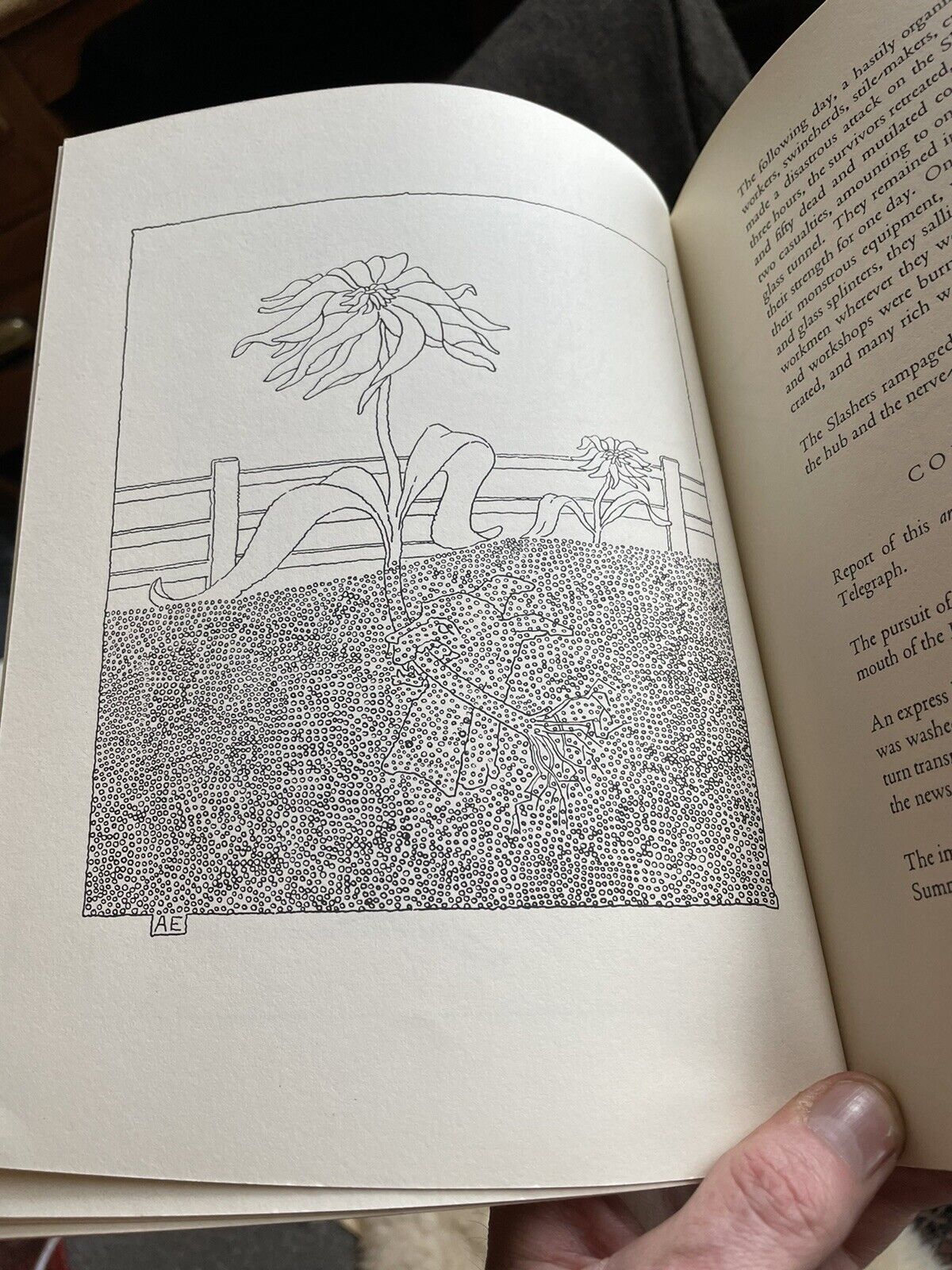1
/
of
11
The Gently Mad Book Shop
MUSRUM Eric Thacker & Anthony Earnshaw WIERD TRIPPY BIZARRE FANTASY Typography
MUSRUM Eric Thacker & Anthony Earnshaw WIERD TRIPPY BIZARRE FANTASY Typography
Regular price
£35.00 GBP
Regular price
Sale price
£35.00 GBP
Unit price
/
per
Tax included.
Couldn't load pickup availability
MUSRUM
By Eric Thacker & Anthony Earnshaw
Published by Jonathan Cape, London, 1971. Reprint but first in this format. Large paperback book with 160 pages. Strange illustrations throughout.
A good copy. Light crease to top corner of front cover. Pages clean throughout. No names or writing.
WE ARE LISTING A COPY OF WINTERSOL BY THE SAME AUTHORS : SEE OUR OTHER AUCTIONS
How to describe Musrum? It’s not a novel; it is more a collection of odd ramblings about a lot of subjects with numerous bizarre illustrations and typography. The authors hide the name Musrum in the illustrations, sometimes pretty abstractly, other times in shadows.
We’ve included some photos to give you some idea (see above).We have also excerpted the section titled “Columbus” below:
By Eric Thacker & Anthony Earnshaw
Published by Jonathan Cape, London, 1971. Reprint but first in this format. Large paperback book with 160 pages. Strange illustrations throughout.
A good copy. Light crease to top corner of front cover. Pages clean throughout. No names or writing.
WE ARE LISTING A COPY OF WINTERSOL BY THE SAME AUTHORS : SEE OUR OTHER AUCTIONS
How to describe Musrum? It’s not a novel; it is more a collection of odd ramblings about a lot of subjects with numerous bizarre illustrations and typography. The authors hide the name Musrum in the illustrations, sometimes pretty abstractly, other times in shadows.
We’ve included some photos to give you some idea (see above).We have also excerpted the section titled “Columbus” below:
Columbus
- Christopher Columbus often related a singular childhood memory, in which he was stopped, in a Genoan street, by a man who asked the way to Chicago.
- Columbus had a left eye of solid gold.
- He had been credited with the invention of Faraway Places.
- There is a religious reason for this.
- On his voyage across the Atlantic, Columbus discovered several (some say six) mid-oceanic islands. The secret of their location died with him.
- Included amongst his baggage as a generous bale of feathers – a gift for the birds of America.
- On landing in the Bahamas, Columbus met a native chief with a left eye of chalcedony. They did a straight swap.
-
In the Bahamas, he frequently held converse with his kindred in Europe. They could hear each other quite clearly over this immense distance.
Musrum a catalogue of banners - Similarly, being a historical figure of great stature, he was able to display to his waiting sponsors in Europe many native artifacts and treasures. He merely needed to hold the objects high above his head.
- Columbus discovered a unique group of islands one hundred and thirty-two miles due south of New York. (See Fig. 1.)
- His cartographer made a chart of this group, using invisible ink – whereupon the islands themselves vanished.
- Fear dissuaded him from entering New York harbor. The place was infested with sponge-cats.
- Musrum had fled the city some days previously,
- Kneeling down by the waters of Lake Huron, Columbus kissed the clear reflection of the Queen of Heaven; then, scooping up a gobletful of her gentle visage, he dashed it against a rock. A small amethyst dropped to the ground. Picking this up he screwed it deftly into his right eye.
- Gott strafe Isabelle!
- Columbus dropped swiftly down to the sea and oblivion.
- He kept a sponge-cat with no eyes at all. He was terribly afraid of it.
-
A.D. 1505. God noticed the existence of America for the first time.
- A,D. 1933. A carrier pigeon released by Columbus arrived in Lisbon; nobody recognized it for what it was.
- For a keepsake, Columbus gave his flagship to a Native Chief. He remained marooned in America until 1502.
- Any European rulers commissioned Columbus to discover new continents so as to enhance their prestige; but he was a monomaniac… He discovered America in fifty-seven slightly different versions.
- It pleased him, in his old age, to converse with other mariners. A wide range of subjects included the sites of sea battles, undiscovered continents, and the repair of ancient islands.
- Crabmeat; wishwater; hard sunshine; milkwet silvershard; Christobus smiling remotely.”
(Loc: Home; H shelf )
Share with someone






















